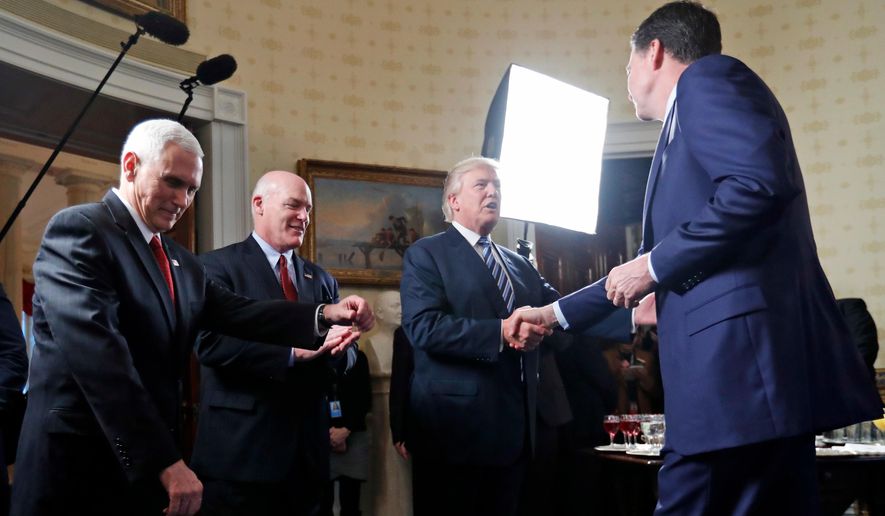The FBI investigation into President Trump and his campaign was “winding down” in May 2017 when the president suddenly fired FBI Director James Comey, according to a bureau agent.
History shows what happened next: Deputy Attorney General Rod Rosenstein, on whose anti-Comey Mr. Trump based his decision, almost immediately appointed Special Counsel Robert Mueller.
He built a staff of mostly Democratic Party-aligned prosecutors who opened probes into a number of Trump associates. Mr. Mueller’s team spent 22 months looking for a Russia-Trump election conspiracy but did not find it. They charged Trump allies with tax fraud, lobbying violations and lying.
FBI Agent William J. Barnett provided his “winding down” assessment of Crossfire Hurricane, where he worked, to the U.S. attorney John Durham team on Sept. 17.
Mr. Barnett’s implication is clear: if Mr. Trump had left Mr. Comey in place there never would have been a special counsel and the Justice Department probe would have soon ended without conspiracy charges.
“The Crossfire Hurricane investigations· seemed to be winding down,” Mr. Barnett told Mr. Durham’s team, according to a Justice Department interview report. “The appointment of the SCO changed ’everything.”
Attorney General William Barr appointed Mr. Durham to investigate how the FBI opened and conducted Crossfire Hurricane.
On July 31, 2016 FBI agent Peter Strzok and his counter-intelligence boss, Bill Priestap, chose four Trump associations to investigate: Retired Lt. Gen. Michael Flynn; campaign volunteers Carter Page and George Papadopoulos and former campaign manager Paul Manafort.
The Barnett interview report said, “Carter Page was interviewed three times and Papadopoulos was also interviewed. Both investigations seemed to be nearing an end with nothing left to pursue.
The Manafort case was moved from an investigative squad to a counter-intelligence squad.
From documents released by the Justice Department in the Flynn case, the FBI moved to close Flynn’s case on Jan. 4, 2107 after finding no evidence of Russia conspiracy. But Mr. Comey reversed the decision because information arrived about Flynn talking to the Russian ambassador during the transition.
Mr. Barnett said the Mueller team saw Flynn as a way to “get Trump.” Flynn pleaded guilty to lying to FBI agent Strzok but was never charged with election conspiracy and did not implicate Mr. Trump.
As for Manafort, his tax case lay dormant at the Justice Department’s money laundering division. Once Mr. Mueller was in place, Andrew Weissmann, who had urged Justice to move against Manafort, brought the case to the special counsel, where he was a senior prosecutor.
Mr. Manafort pleaded guilty to tax and lobbying violations, but faced no Russian conspiracy charges.
The 13-page Barnett interview report described the scene after Mr. Mueller took over:
“Mueller was leading the SCO. Search Warrants were being drafted and executed on a regular basis. Attorneys in the SCO were very aggressive and were directing things. Barnett described the SCO situation as upside down with attorneys drafting search warrants and getting agents to simply act as affiants. Barnett thought there was a ’get TRUMP’ attitude by some at the SCO.”
The report also said, “Barnett did not believe Flynn had any additional information to provide to SCO. Barnett believed the prosecution of Flynn by SCO was used as a means to ’get Trump.’”
Mr. Comey testified to a House task force that when he left the bureau in May he saw no evidence of a Russia conspiracy.
• Rowan Scarborough can be reached at rscarborough@washingtontimes.com.




Please read our comment policy before commenting.